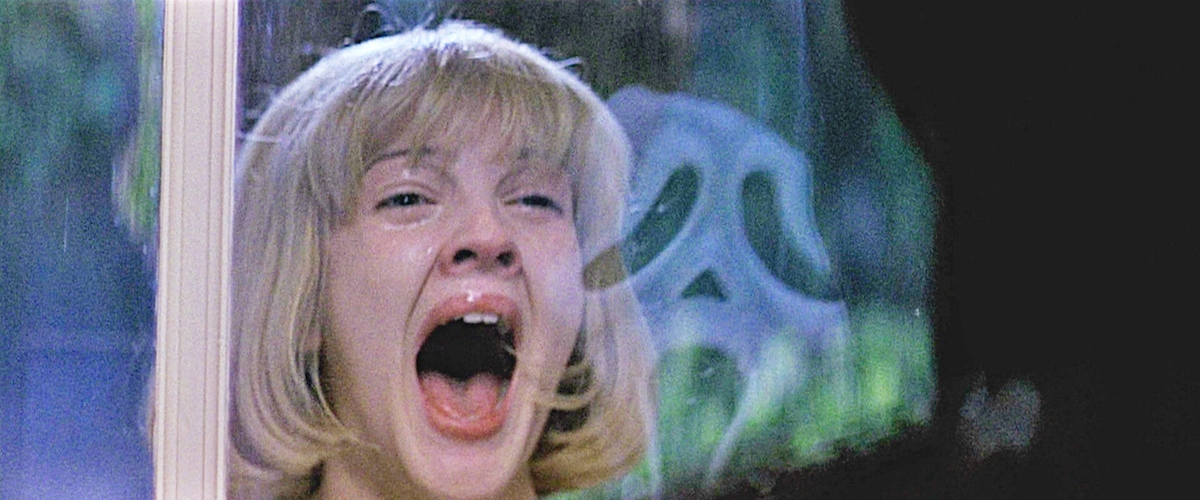Wes Craven’s “Scream” violates one of the oldest rules in movie history: It’s about characters who go to the movies. They’ve even heard of movie stars. They refer by name to Tom Cruise, Richard Gere, Jamie Lee Curtis. They analyze motivations (“Did Norman Bates have a motive? Did Hannibal Lecterhave a reason for wanting to eat people?”) True, they went to the movies in “TheLast Picture Show” and the heroes of “Clerks” worked in a video store. Even Bonnie and Clyde went to the movies. But those movies were about the *act* ofgoing to the movies. “Scream” is about *knowledge* of the movies: The characters in “Scream” are in a horror film, and because they’ve seen so many horror films, they know what to do, and what not to do. “Don’t say ‘I’ll be right back,’ “one kid advises a friend, “because whenever anybody says that, he’s *never* right back.” In a way, this movie was inevitable. A lot of modern film criticism involves “deconstruction” of movie plots. “Deconstruction” is anacademic word. It means saying what everybody knows about the movies in words nobody can understand. “Scream” is self-deconstructing; it’s like one of those cans that heats its own soup.
Insteadof leaving it to the audience to anticipate the horror clichés, the characters talk about them openly. “Horror movies are always about some big-breasted blondwho runs upstairs so the slasher can corner her,” says a character in “Scream.” “I hate it when characters are that stupid.” The movie begins, of course, with a young woman (Drew Barrymore) at home alone. She gets a threatening phone call from an evil Jack Nicholson sound-alike. She is standing in front of patio doors with the dark night outside. She goes into a kitchen where there are lotsof big knives around. You know the drill.
Later, we meet another young woman (Neve Campbell). Her father has left for the weekend. Her mother was murdered…why, exactly a year ago tomorrow! Her boyfriend climbs in through the window. At high school, rumors of cult killings circulate. The killer wears a spooky Halloween costume named “Father Death.” There are more phone calls, more attacks. The suspects include the boyfriend, the father, and a lot of other people. A nice touch: The high school principal is The Fonz.
All of that is the plot. “Scream” is not about the plot. It is about itself. In other words, it is about characters who *know* they are in a plot. These characters read Fangoria magazine. They even use movie-style dialogue: “I was attacked and nearly filleted last night.” The heroine has been rejecting her boyfriend’s advances, and just as well: As another character points out, virgins are never victims in horror films. Only bad boys and girls get slashed to pieces. Realizing they’re in the midst of a slasher plot, the characters talkabout who could play them: “I see myself as sort of a young Meg Ryan. But with my luck, I’ll get Tori Spelling.” The movie itself, for all of its ironic in-jokes, also functions as a horror film–a bloody and gruesome one, that uses as many clichés as it mocks.
One old standby is the scene where someone unexpectedly enters the frame, frightening the heroine, while a sinister musical chord pounds on thesoundtrack. I love these scenes, because (a) the chord carries a message of danger, but (b) of course the unexpected new person is always a harmless friend, and (c) although we can’t see the newcomer because the framing is sotight, in the real world the frightened person would of course be able to see the newcomer all the time.
The movie is also knowledgeable about the way TV reporters are portrayed in horrorfilms. The reporter this time, played by Courteney Cox of “Friends,” asks wonderful questions, such as “How does it feel to almost be the victim of aslasher?” Savvy as she is, she nevertheless suggests to a local deputy that they shouldn’t drive to an isolated rural setting when it’s a nice night to walk down a deserted country road in the dark while a slasher is loose.
What did I think about this movie? As a film critic, I liked it. I liked the in-jokes and the self-aware characters. At the same time, I was aware of the incredible level of gore in this film. It is *really* violent.
Is the violence defused by the ironic way the film uses it and comments on it? For me, it was. For some viewers, it will not be, and they will be horrified.
Which category do you fall in? Here’s an easy test: When I mentioned Fangoria, did you know what I was talking about?




















